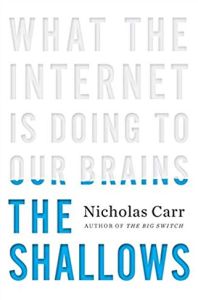Join getAbstract to access the summary!

Join getAbstract to access the summary!
Nicholas Carr
The Shallows
What the Internet Is Doing to Our Brains
W.W. Norton, 2010
What's inside?
Find out how the Internet is changing your brain.
Recommendation
Business author Nicholas Carr enters Malcolm Gladwell territory with an insightful, far-reaching book of essays on how your brain works, how the Internet alters your perceptions and habits, and what the consequences of those alterations might be. Stretching from Aristotle to Google, Carr seeks to understand the magnitude of the change the Internet presents, and to gauge whether that change is for good or ill. He does not offer answers to his more provocative philosophical questions, preferring that the reader sort those out. But he frames these fascinating queries in detailed disquisitions on futurism, the creation of computing, the history of the written word and the evolution of science’s notions of the brain and how it functions. His relaxed writing style provides a companionable read, as if you were having a great conversation with a brilliant stranger. getAbstract recommends this enjoyable, nourishing book to everyone who’s ever wondered how working on a computer might be affecting their lives and their brains.
Summary
About the Author
Nicholas Carr, a former executive editor of Harvard Business Review, wrote The Big Switch: Rewiring the World, from Edison to Google.


















Comment on this summary